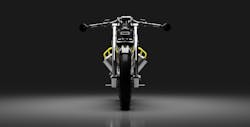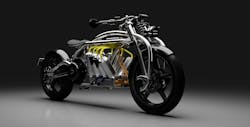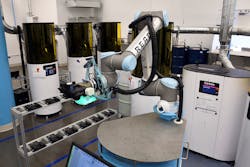Additive Manufacturing Expertise Brings Stunning Electric Motorcycle to Market
If you’re passionate about well-made machines, the new Zeus 8 premium electric motorcycle may well set your heart beating faster. It’s not just the sleek lines and advanced engineering that draw the eyes. It’s the obvious attention to detail in manufacturing the parts that make up the innovative Curtiss motorcycle.
The Curtiss Motorcycle Co. had been making motorcycles in New Orleans for 20 years, until the winds from Hurricane Katrina literally blew its factory down. Relocating to the small city of Leeds, Alabama, just east of Birmingham, the company restored an old factory and set about on a new mission to make a sustainable bike based on first principals—such as scale, proportion, and stance—that draw from the earliest days of motorcycle design.
The Zeus 8 is now in production and will come to market in 2020. It’s the result of a partnership between Curtiss and Fast Radius, an additive manufacturing company, which produced more than 60 parts and components for the bike using three separate legacy and additive manufacturing processes.
“Our partnership with Curtiss is ideal because it allows them to do what they do best—designing stunning motorcycles, while we do what we do best—matching the project with the right manufacturing technologies and getting parts made quickly and efficiently,” says Brian Simms, vice president of sales at Fast Radius. “With the Zeus 8, we’re achieving first-pass yields of more than 96%.”
Both companies expect to collaborate on future iterations of the Zeus, as well as Curtiss’ upcoming models: Hades, Psyche, and Eros. The latter two models will compete with Harley-Davidson’s LiveWire electric motorcycle. Both deliver a range of 100 miles in stop-and-go traffic or 60 miles at a top speed of 70 mph. Recharging takes 30 minutes at a commercial recharging station or overnight at home. The battery pack can be replaced, allowing bike owners to keep up with rapidly improving battery technology.
“Bringing Zeus’ advanced design to life wasn’t easy,” says H. Matthew Chambers, CEO and chairman of the board for Curtiss. “We knew we needed a partner like Fast Radius that could innovate with us, not just make the parts. Their best-in-class manufacturing approach and operational efficiencies will also enable us to deliver our next model—the Zeus 9—on time, satisfying the strong demand from our global audience.”
Making the unmakeable
The mission of Fast Radius, which is based in Chicago’s West Loop, is to make new things and business models possible for its customers by using legacy and additive manufacturing processes to help make formerly “unmakeable” products, according to Simms. In addition to its in-house manufacturing capabilities, the fast-growing company has partnered with UPS to create an efficient supply chain.
As the mid-summer 2019 launch date for the Zeus 8 motorcycle approached, Curtiss’s CNC suppliers for the prototype were quoting long lead times and experiencing difficulty in delivering on the company’s uncompromising design and quality requirements. Curtiss then turned to Fast Radius and its expertise in application engineering, smart manufacturing, and operational efficiency to come up with solutions.
The Curtiss team had designed large, sleek parts to make the bike distinctive, but most CNC machines couldn’t create parts as large as Curtiss needed. Making and assembling smaller pieces into a larger part wasn’t an option since it wouldn’t give the bike the polished, dramatic look the designers had envisioned.
To solve this, the application engineers at Fast Radius worked with Curtiss to ensure their part designs were optimized for the manufacturing technologies to be used. The goal was to ensure parts were easier to make without compromising design standards, changing the bike’s performance, or adding weight to the final product. While five-axis milling, which is rare in CNC machines, was the best way to produce large parts, many smaller parts required a hybrid mix of manufacturing solutions, both legacy and additive.
“The original ribbing in the bike’s neck, for example, which was intended to create small spaces that would reduce weight, was eliminated because it would be almost impossible to manufacture,” says Fast Radius project lead, Brian Coil. “We came up with an alternative that took out the ribs while still taking out the weight. Another innovation was the hard-edged bottom of the bike, which was made using electrical discharge machining—the biggest application of the technology that I’ve ever seen. We also used additive manufacturing for the bike’s fenders.”
The Zeus 8 employs a monocoque structural skin connected to the chromoly steel framework at the neck, which transmits energy needed to keep the bike’s parts perpendicular even at high torques and also contributes to its structural integrity. Alloying elements for the steel include chromium and molybdenum, which yield a strength-to-weight ratio that is considerably stronger than standard 1020 steel. Eight banks of visible, V8-style battery cylinders power the bike, and the battery housing is itself a structural component.
After Curtiss and Fast Radius completed their design for each part and chose the appropriate manufacturing technology, they immediately moved into production. Fast Radius’ lean manufacturing model, project management expertise, and strategic partnership with UPS meant that parts were produced and delivered in only 12 days, a full two days faster than any other suppler could offer. More importantly, they were able to get the parts right the first time.
Curtiss has now engaged Fast Radius in an ongoing partnership to make parts for its entire line of luxury electric motorcycles. “Downloading a lot of our engineering problems to Fast Radius allows us to stay focused and lowers our fixed overhead costs, and they can scale manufacturing for us,” explains Chambers. “This is the future for small batch manufacturing.”
The two companies are seeking further innovations and are exploring other parts on the motorcycle that could be made additively. For example, the seat and handle grips of the Zeus 8 will be designed and engineered using industrial-grade 3D printing technology. The bike’s seat will deploy another technology, Carbon dynamic light scattering, to create a customized lattice based on a customer’s height and weight.
“Fast Radius can get us the best parts with the shortest lead times, but that’s not the only reason we partner with them,” says Chambers. “We work with them because they push us toward the cutting edge of manufacturing technology. We’re creating the most advanced motorcycles the world has ever seen, and Fast Radius is committed to making our vision a reality.”



